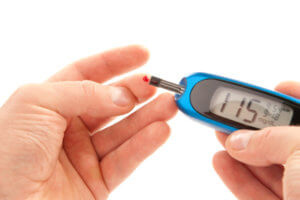Healthy Weight and Blood Sugar Dysregulation -- KISS (Keep It Simple and Stable)
If you have trouble losing weight, blood sugar management is very possibly the key to success. Of course, a "good" weight and blood sugar dysregulation don't always go hand-in-hand... Who doesn't know a skinny diabetic?
It's the "healthy" piece that is not possible if you have blood sugar dysregulation. It's implicated in SO MANY health challenges, either as cause, contributing factor or consequence.
Blood sugar dysregulation and reactive hypoglycemia (RH)...
Have been associated with an increased risk of many diseases, including diabetes, heart disease and Alzheimer’s.
Some research is beginning to show that highly variable blood sugar may be more damaging to the body than chronic hyperglycemia.
Have been associated with mood and anxiety disorders, depression and bipolar disorder in particular. A blood sugar rollercoaster does not promote a stable mood. In contrast, stable blood sugar helps maintain a stable mood and even temperament.
RH has been implicated as a significant causative factor for violence and aggression in the prison population.
The link between RH and metabolic disease in general is striking.
Another possible consequence of reactive hypoglycemia is problems with the hypothalamus – pituitary – adrenal (HPA) axis. When blood sugar crashes and a person becomes hypoglyemic, the adrenal glands release cortisol. When this cycle repeats chronically, it can cause HPA dysfunction (what we used to call "adrenal fatigue").
What is "Reactive Hypoglycemia" or RH? If your blood sugar goes up and down like a roller coaster (like mine), you might have reactive hypoglycemia. It’s not “high blood sugar” (hypERglycemia) or “low blood sugar” (hypOglycemia), it's a combination of both! Mr. Mouse's Wild Ride in the blood sugar world.
I recently lost 25 pounds, yay! I lost it using a low carb diet and an appetite-suppressing supplement. Low carb and calorie reduction turned out to be the perfect storm for my initial weight loss.
I also had another goal: to correct my blood sugar dysregulation, the reactive hypoglycemia.
The supplement was supposed to help with that as well as reverse insulin resistance. Sure, my bs tested low while I was on the supplement, but there was no long term effect. Now that I'm no longer taking it, my blood sugar is back to roller coaster and I didn't change my diet. Harrumph.
And if bs is on a roller coaster, insulin resistance is still in play.
Insulin's main job is to push glucose into cells where the mitochondria turn it into fuel for your muscles and your brain. When you have insulin resistance, your body ignores insulin so the glucose stays in your blood stream. A result is that your body is not getting any fuel which leads to brain fog and fatigue!
So none of that really got any better. The other thing is that my weight loss stalled, and I'm on track to lose 20 more pounds.
Yes, I want it all: blood sugar and weight management. Oh, and digestive health -- that's the other missing link in my profile. I've come a long since being hospitalized in 2010 and three long weeks of IV antibiotics. That does a number on your biome!
While there's been lots of healing the last 7 years, it's time to push that over the edge into major Gut Vitality!!!
What Causes Blood Sugar to Go UP?
Generally 2 things:
1. Stress, good or bad. In a stressful situation, your body releases cortisol. Cortisol tells your body to release glucose into your bloodstream because this makes you feel powerful and energized *just like a snicker's bar*. You suddenly have the wherewithal to fight or flee from the tiger.
2. Eating sugar. This can be sugar, honey, artificial sweeteners or any other carb. All carbs (and starches) turn to sugar in the body. Every. Single. One. Even broccoli.
And, yes, artificial sweeteners can raise your blood sugar! This is why stevia and xylitol are preferred: they don't muck with blood sugar for most people.
There are two other widely acknowledged factors that can influence blood sugar. Those are H. pylori, a common and communicable bacterial infection of the stomach lining. The last is toxic metal poisoning. (There are tests available to uncover these and protocols to heal them.)
Here's the 3-Part Plan to Reverse Reactive Hypoglycemia
1. Diet
We can probably agree that Food is foundational to good health and stable blood sugar. With clients, I always start with food. Always. If a client is eating poorly and is serious about reclaiming health, diet must be addressed.
So, I'm sticking with the low carb, high protein/fat and watching the calories. NO sugar except on a VERY special occasion. I use a little stevia in my keto coffee (recipe here) but I no longer crave carbs -- huge help, that!
I also don't eat my first meal until around noon, my last bite around 8pm. (This is basic Intermittent Fasting -- a post is coming on that very soon. Skipping breakfast or dinner is an easy way to cut out 500 calories!)
So Why Eat Low Carb?
Because in both the Atkins and keto diet (both high protein/fat, very low carb) you are starving your body of glucose, requiring it to burn fat for fuel instead of sugar. Your fat is metabolized in your liver and your liver spits out ketones.
This is called being in ketosis. Your body uses those ketones as fuel for your muscles and brain.
BASIC INFO: Most of us in the civilized world are sugar-burners, rather than fat-burners. Interestingly, we are born FAT-burners, then convert to being sugar-burners over time due to the high sugar/carb content of our diets. This is not a good thing. Being a sugar burner keeps you fat! More on this here.
Ketones are a preferred fuel because they are longer and slower burning. Glucose is like kindling: burns fast, then you need more. Ketones are like coal: long slow burn, energy for hours.
And, with ketones, there is no brain fog BECAUSE NO INSULIN IS REQUIRED TO GET KETONES INTO THE CELLS! So insulin resistance does not affect your cells getting the fuel they need! < < < This is huge in the blood sugar management world!
Did you know that your body has no (as in zero) requirement for carbs? I'm not suggesting that you NEVER eat carbs! Just that if you didn't, you'd be perfectly fine. Your body does have a requirement for a small amount of glucose for certain processes. And, just like cholesterol, your body will make that glucose from whatever you've eaten, including fat if that's all ya got for dinner. Carbs not required.
2. Supplements
I'm using a new system aimed specifically at digestive health, blood sugar management and reducing systemic inflammation. It includes a drink with chromium, ALA, a prebiotic and a few other goodies; a cleansing formula with magnesium; and a probiotic with an anti-candida component.
All natural, plant-based, most ingredients are non-GMO.
I started two weeks ago and so far so good. I'm giving it 60 days and will report back. It has all the right ingredients in 3 supplements which means I don't have to take a boat load of other supplements. Count me in for that!!!
3. Exercise
There are 2 burning questions re. exercise: is it required? And what's the best strategy?
To answer the first in a word: NO. Exercise is not required to stay alive and be on the planet for quite some time. But here's the thing...
Muscle mass is a predictor of longevity. The more muscle you have, the longer you are expected to live. Why? Because the more muscle you have, the more mitochondria you have and mitochondria are the life force of the body.
Plus, of course, exercise makes your muscles strong, your bones dense, keeps your joints lubricated, your blood pumping, your lungs moving... it improves your mood, your sleep... Is there a bodily process NOT improved by exercise?
The only real inherent danger of exercise is OVER exercising. Most of us have no need to fear that!
What's the best exercise strategy?
Most of us want to know what's the least amount of exercise we can do to remain fit and strong enough to happily endure a long life.
Before we answer that, let's examine your current level of fitness.
Do this: lie on the floor flat on your back and get up without using your arms. At all.
Once you can't get off the floor by yourself, you are literally one step away from a nursing home.
My grandmother died at 96 laying in her bed because she couldn't get up. She was too weak. Her mind was still sharp, but she lay there until her organs gave out. It took months.
No, thank you.
What's the minimum exercise you can do to be strong and healthy? The very minimum is 4 minutes 3 times a week. That's 12 minutes a week total. These are Tabatas and are described in detail here. Anyone can do this.
Another method, the one we currently enjoy, is to simply do something as hard as you can three times a week. For example, a 4-12 minute Tabata session one day; as many pushups as possible in 3 sets the next; go the gym for a 15 minute McGuff-style heavy weight workout the third day.
The only rule for your workout regime is to keep it simple and keep it hard.
No fancy clothes -- we usually wear what we've got on to workout and to the gym. (Except blue jeans or heavy-duty clothes -- they tend to "wear" on the equipment cushions.)
Personally, I notice that when I'm working out, my weight loss moves right along! When I stop, it stops. There are biological reasons for this -- you'll find more explanation than you ever dreamed of at ketogains.com!
Remember: you don't have to LOOK like Jack to FEEL like Jack!
A little bit of exercise goes a long way. You just have to DO it :)
Meanwhile, here's a great question: does your body support you in your desired lifestyle? Is there anything you want to do that you fear you won't be able because of your strength?
Can you play with your children/grands after a long day at work? Read to them? Be interested in what they are doing? Do you have the strength to garden? Sight-see? Travel?
Or do you watch from the sidelines? If you are only able to watch from the sidelines and rather wish you could jump in, then get up and move. 4 minutes. No one can do it for you and the rewards are far, far greater than the effort.




